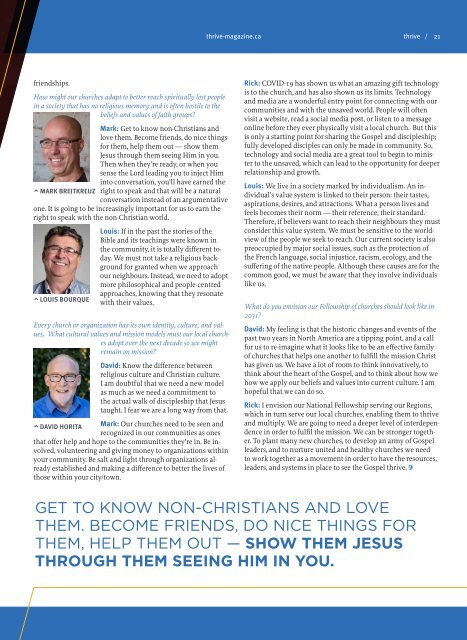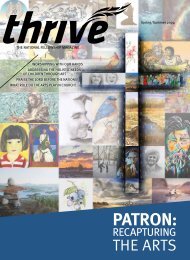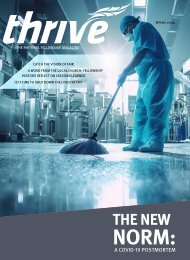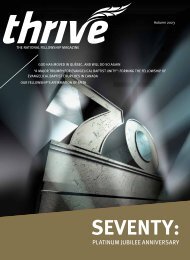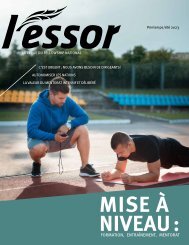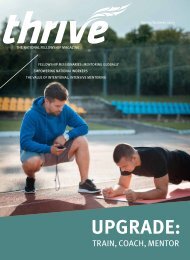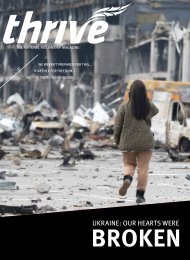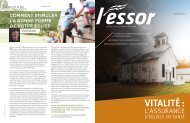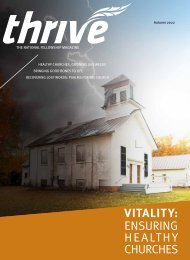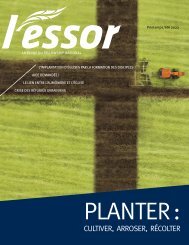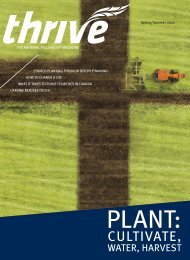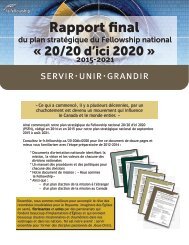Create successful ePaper yourself
Turn your PDF publications into a flip-book with our unique Google optimized e-Paper software.
thrive-magazine.ca<br />
thrive / 21<br />
friendships.<br />
How might our churches adapt to better reach spiritually lost people<br />
in a society that has no religious memory and is often hostile to the<br />
beliefs and values of faith groups?<br />
Mark: Get to know non-Christians and<br />
love them. Become friends, do nice things<br />
for them, help them out — show them<br />
Jesus through them seeing Him in you.<br />
Then when they’re ready, or when you<br />
sense the Lord leading you to inject Him<br />
into conversation, you’ll have earned the<br />
MARK BREITKREUZ right to speak and that will be a natural<br />
conversation instead of an argumentative<br />
one. It is going to be increasingly important for us to earn the<br />
right to speak with the non-Christian world.<br />
><br />
><br />
Louis: If in the past the stories of the<br />
Bible and its teachings were known in<br />
the community, it is totally different today.<br />
We must not take a religious background<br />
for granted when we approach<br />
our neighbours. Instead, we need to adopt<br />
more philosophical and people-centred<br />
approaches, knowing that they resonate<br />
with their values.<br />
Every church or organization has its own identity, culture, and values.<br />
What cultural values and mission models must our local churches<br />
adopt over the next decade so we might<br />
remain on mission?<br />
David: Know the difference between<br />
religious culture and Christian culture.<br />
I am doubtful that we need a new model<br />
as much as we need a commitment to<br />
the actual walk of discipleship that Jesus<br />
taught. I fear we are a long way from that.<br />
DAVID HORITA Mark: Our churches need to be seen and<br />
recognized in our communities as ones<br />
that offer help and hope to the communities they’re in. Be involved,<br />
volunteering and giving money to organizations within<br />
your community. Be salt and light through organizations already<br />
established and making a difference to better the lives of<br />
those within your city/town.<br />
><br />
LOUIS BOURQUE<br />
Rick: COVID-19 has shown us what an amazing gift technology<br />
is to the church, and has also shown us its limits. Technology<br />
and media are a wonderful entry point for connecting with our<br />
communities and with the unsaved world. People will often<br />
visit a website, read a social media post, or listen to a message<br />
online before they ever physically visit a local church. But this<br />
is only a starting point for sharing the Gospel and discipleship;<br />
fully developed disciples can only be made in community. So,<br />
technology and social media are a great tool to begin to minister<br />
to the unsaved, which can lead to the opportunity for deeper<br />
relationship and growth.<br />
Louis: We live in a society marked by individualism. An individual’s<br />
value system is linked to their person: their tastes,<br />
aspirations, desires, and attractions. What a person lives and<br />
feels becomes their norm — their reference, their standard.<br />
Therefore, if believers want to reach their neighbours they must<br />
consider this value system. We must be sensitive to the worldview<br />
of the people we seek to reach. Our current society is also<br />
preoccupied by major social issues, such as the protection of<br />
the French language, social injustice, racism, ecology, and the<br />
suffering of the native people. Although these causes are for the<br />
common good, we must be aware that they involve individuals<br />
like us.<br />
What do you envision our Fellowship of churches should look like in<br />
2031?<br />
David: My feeling is that the historic changes and events of the<br />
past two years in North America are a tipping point, and a call<br />
for us to re-imagine what it looks like to be an effective family<br />
of churches that helps one another to fulfill the mission Christ<br />
has given us. We have a lot of room to think innovatively, to<br />
think about the heart of the Gospel, and to think about how we<br />
how we apply our beliefs and values into current culture. I am<br />
hopeful that we can do so.<br />
Rick: I envision our National Fellowship serving our Regions,<br />
which in turn serve our local churches, enabling them to thrive<br />
and multiply. We are going to need a deeper level of interdependence<br />
in order to fulfil the mission. We can be stronger together.<br />
To plant many new churches, to develop an army of Gospel<br />
leaders, and to nurture united and healthy churches we need<br />
to work together as a movement in order to have the resources,<br />
leaders, and systems in place to see the Gospel thrive.<br />
GET TO KNOW NON-CHRISTIANS AND LOVE<br />
THEM. BECOME FRIENDS, DO NICE THINGS FOR<br />
THEM, HELP THEM OUT — SHOW THEM JESUS<br />
THROUGH THEM SEEING HIM IN YOU.


